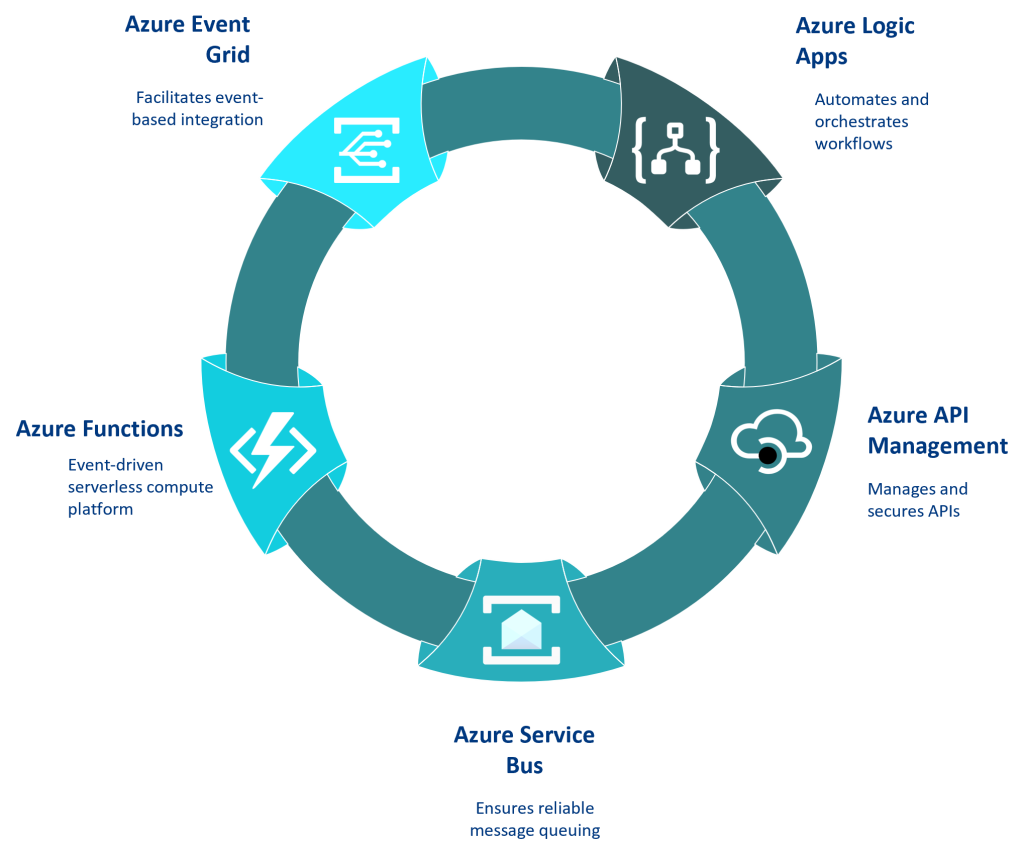
Local governments across Australia are increasingly prioritising local government integration to modernise legacy systems. By leveraging industry solutions like TechnologyOne CiA Integration, ERP Integration, and Azure Integration Services for Councils, councils are transforming community service delivery.
In this blog article, we explore the integration challenges faced by local councils, the benefits of leveraging Azure integration services, and how adopting a cloud-first approach can revolutionise council operations and service delivery.
Local Government Integration Challenges: Overcoming Legacy System Barriers
Councils today manage a vast range of services—from processing rates and property data to running complex finance and ERP systems. However, many of these systems are legacy applications that were not built to ‘talk’ to one another. This disconnect leads to:
- Data Silos: Financial, property, and rating data are often held in separate systems, creating gaps in communication and hindering robust reporting.
- Complexity of Legacy Systems: Older council systems can be expensive to maintain, difficult to upgrade, and resistant to change.
- Inefficiencies in Service Delivery: Without seamless integration, council staff spend precious time reconciling data manually, increasing the chance of errors and delaying responses to community needs.
- Inconsistent Customer Experience: Residents seeking information or services may be frustrated by discrepancies across platforms, particularly when council data such as rates and property information are out-of-sync.
- Compliance and Security Concerns: With data becoming increasingly distributed across multiple environments, ensuring robust security and compliance with Australian government standards is a critical challenge.
These challenges underscore the urgent need for councils to adopt a modern, integrated approach. Microsoft Azure integration services provide the capability to connect disparate systems, streamline operations, and deliver accurate, real-time insights to decision-makers.
What Are Azure Integration Services?

Microsoft Azure offers a comprehensive suite of integration tools that enable local governments to consolidate data from on‑premises and cloud-based systems. Azure integration services include products such as:
- Azure Logic Apps: A cloud service that automates and orchestrates tasks and workflows—ensuring seamless data flow between applications.
- Azure API Management: Helps councils securely publish, manage, and monitor APIs to bridge legacy systems with newer platforms.
- Azure Service Bus: Provides reliable message queuing and communication between different services, ensuring that data is relayed accurately even when applications operate on different schedules.
- Azure Functions: Simplify complex orchestration problems with an event-driven serverless compute platform
- Azure Data Factory: Facilitates the movement, transformation, and orchestration of data across systems, enabling real-time analytics and efficient reporting.
- Azure Event Grid: Enables real-time event-based integration, ensuring that updates in one system trigger immediate actions in another.
Together, these tools empower councils to create a unified integration framework that supports both synchronous and asynchronous communications across systems.
ERP Integration for Councils Using Azure Integration Services

Council finance departments manage budget reporting, revenue collection, and expenditure tracking on platforms that often predate the digital era. Integrating these systems with modern cloud-based applications can dramatically improve efficiency and accuracy.
Key Benefits for Finance Systems
- Real-Time Data Synchronisation: Azure Data Factory and Logic Apps can connect to on‑premises financial systems and cloud applications, ensuring that financial data is updated in real time. This eliminates the need for end‑of‑day manual reconciliations and reduces the risk of errors.
- Improved Reporting and Analytics: Integrating disparate financial data sources enables councils to produce comprehensive financial statements and performance dashboards. By combining legacy data with real-time updates, decision-makers gain a clearer picture of budget performance.
- Enhanced Process Automation: Routine tasks such as invoice processing, fund transfers, and reconciliation are automated using Azure Logic Apps. Automation not only frees up staff time but also ensures consistency in financial operations.
- Increased Security and Compliance: Azure’s robust security features help councils meet rigorous compliance standards. Secure API connections ensure that sensitive financial data is transferred safely between systems.
Example: Imagine a council that uses a legacy system for recording rates and another for managing budget expenditure. By using Azure API Management and Logic Apps, these systems can now communicate seamlessly, enabling finance staff to generate integrated reports in minutes rather than days.
Streamlining Property & Rating Systems
Property and rating systems form the backbone of many council operations, governing how rates are calculated and administered for residential and commercial properties. Yet, many of these systems were developed years ago without the foresight for integration.
How Azure Can Transform Property & Rating Operations
- Unified Data Consolidation: Azure Data Factory can pull property data from various sources—such as land records, rating registers, and property management systems—into a centralised repository. This integrated data source not only simplifies day-to-day operations but also provides a solid foundation for business intelligence initiatives.
- Improved Accuracy and Consistency: By integrating property and rating systems with other council systems (for example, finance and asset management), councils can eliminate discrepancies and ensure that data on property valuation, occupancy, and owner details are consistent across departments.
- Faster Decision-Making: Automated workflows triggered by Azure Logic Apps ensure that changes in property data (such as new developments or changes in occupancy status) are reflected immediately in rating calculations. This rapid update cycle significantly enhances the responsiveness of the council’s systems.
- Enhanced Customer Service: When systems are seamlessly integrated, residents experience less frustration caused by inconsistent property data. Online portals and self-service applications can provide accurate, real-time information about property assessments and rates.
Example: A local government might face delays in updating property tax records following a major property development. With Azure integration, updates from property databases can trigger automated recalculations in the rating system, ensuring that residents and council staff receive timely and accurate billing information.
Broader ERP Integration Solutions
Beyond finance and property systems, councils rely on Enterprise Resource Planning (ERP) solutions to manage a broad array of processes—including procurement, human resources, asset management, and community services. However, implementing and managing comprehensive ERP systems can be complex, particularly when dealing with legacy applications.
Benefits of Integrating ERP with Azure
- Consolidated View of Operations: ERP systems often consist of disparate modules that operate in isolation. Azure integration can bring these modules together, offering a real‑time, consolidated view of all council operations. This holistic approach enhances reporting, budgeting, and forecasting.
- Seamless Data Exchange: Using Azure API Management and Service Bus, councils can integrate ERP modules with other third‑party systems and legacy applications. This seamless data flow supports interoperability and reduces manual data entry.
- Enhanced Scalability and Flexibility: Cloud‑based integration using Azure ensures that ERP systems can scale to meet growing demands. Whether it’s adding new modules or connecting additional data sources, Azure’s flexible infrastructure supports ongoing expansion.
- Cost-Effective Integration: Moving to Azure integration services can reduce the overall cost of ownership. By modernising integration methods, councils can avoid costly custom development and reduce the need for extensive in‑house IT support.
- Future-Proofing Operations: As councils plan for future digital transformation initiatives, integrating their ERP systems on Azure ensures that their technological infrastructure remains agile and adaptable to emerging trends and compliance requirements.
Example: A council upgrading its ERP system to TechnnologyOne CiA for a more efficient supply chain process can use Azure Logic Apps to synchronise data between ERP modules and finance systems, enabling faster reconciliation of purchase orders and payments. This streamlining supports better forecasting and procurement planning.
Key Benefits of Azure Integration for Local Governments
Adopting Azure integration services offers a host of benefits, specifically tailored to the needs of local government. Here are some of the major advantages:
- Improved Operational Efficiency: By automating data flows and eliminating manual processes, councils can drastically reduce administrative overhead.
- Enhanced Data Accuracy and Consistency: Integrated systems provide a single source of truth, minimising errors that arise from data duplication and siloed systems.
- Faster Response Times: Real‑time integration enables rapid decision‑making and immediate updates across systems, which is crucial for timely service delivery.
- Stronger Data Security: Azure’s robust security framework ensures that sensitive council data—ranging from financial records to property details—is protected across all integrated channels.
- Cost Savings: Moving to a cloud-based integration model reduces maintenance costs associated with legacy systems and minimises the need for expensive custom integrations.
- Scalability: Azure integration solutions grow with the council’s needs, whether that means handling increased transaction volumes or incorporating new data sources.
- Compliance and Reliability: Azure’s adherence to stringent security and compliance standards, including those demanded by the Australian Government, guarantees that councils meet regulatory requirements while maintaining high service availability.
TechnologyOne Integration Success Stories
Shellharbour City Council

At Shellharbour City Council, we used to manually transfer data for approximately 800 development applications per year between our local system and the NSW Planning Portal. This cumbersome and error-prone process was a significant drain on our resources.
With Accelerate Tech’s ePlanning.io platform, everything changed. The platform’s seamless integration and automation capabilities removed the need for manual data transfer, streamlining our application process and significantly reducing human error.
Since implementing ePlanning.io, we’ve seen tangible benefits. We’re saving considerable time and resources, our application process is more accurate and efficient, and we’re able to adapt swiftly to API changes. The ongoing support from ePlanning.io ensures we’re always up to date.
Thanks to Accelerate Tech’s ePlanning.io platform, Shellharbour City Council now operates more efficiently, better serving our community and handling development applications effectively.
– Adele Smith | IT Operations Manager, Shellharbour City Council
Ensuring Data Security and Regulatory Compliance

For local governments, data security and compliance are paramount. Azure integration services come with built‑in safeguards, including:
- Encryption: Data is encrypted both in transit and at rest using industry‑standard protocols, ensuring that sensitive council data is secure from unauthorised access.
- Access Controls: Robust role‑based access control (RBAC) and identity management ensure that only authorised personnel can access or modify integration workflows and data.
- Compliance Certifications: Azure is certified against major international and Australian Government compliance standards. This offers councils reassurance that their data handling practices meet rigorous regulatory requirements.
- Monitoring and Logging: Azure’s monitoring tools track integration activities, providing real‑time alerts and comprehensive logs that aid in compliance reporting and incident response.
By leveraging these capabilities, councils can confidently implement Azure integration solutions without compromising on security or regulatory adherence.
Getting Started with Azure Integration in Your Council
For local governments that are considering an upgrade to Azure-based integration services, the following steps can provide a roadmap:
- Assessment: Conduct an IT assessment to identify which legacy systems—such as finance, property, and ERP solutions—would benefit most from modern integration.
- Planning: Develop a strategic roadmap that aligns Azure integration services with council priorities. Engage with internal stakeholders to understand user requirements and pain points.
- Pilot Project: Start with a pilot project targeting a specific integration challenge. For example, integrate property data with finance systems using Azure Logic Apps and monitor the outcomes.
- Training and Change Management: Provide training for IT staff and end users to ensure a smooth transition. Change management is crucial for a successful digital transformation.
- Scale and Expand: Once the pilot project proves successful, scale the integration across other council systems and consider additional services such as API Management for third-party application integration.
- Monitor and Optimise: Use Azure’s monitoring and reporting tools to continually assess integration performance and make adjustments as needed.
By following these steps, local governments can transition gradually and confidently towards a fully integrated, cloud‑based operational model that meets the needs of today and prepares them for the future.
Conclusion
Digital transformation is no longer a distant vision for councils—it is a pressing reality. Integration challenges in finance, property and rating systems, and broader ERP solutions can hamper the efficiency of service delivery and reduce stakeholder trust. Microsoft Azure integration services offer a robust, secure, and scalable solution that bridges legacy systems with modern cloud applications.
For councils looking to improve operational efficiency, enhance reporting accuracy, and deliver better services to their communities, Azure integration provides the toolkit necessary for transformation. By automating workflows, consolidating data, and ensuring regulatory compliance, councils can not only save on costs but also build a more agile, responsive, and transparent administration.
Local governments that embrace Azure integration will find themselves better equipped to meet the evolving needs of their communities, stay ahead of technological change, and position themselves favourably for a future driven by data‑smart decision-making. Now is the time to consider how Azure’s integration services can be tailored to your council’s unique challenges and pave the way for smarter, faster, and more secure service delivery.
If your council is ready to take the next step in digital transformation, now is the time to explore how Microsoft Azure integration services can unlock new efficiencies and drive meaningful change. Embrace the future by connecting your systems, consolidating your data, and transforming operational workflows with the trusted and proven capabilities of Azure.
If you’re interested in learning more about Azure integration for your council or would like to discuss a pilot project, get in touch with your local Microsoft partner or contact your IT department for a consultation. The transformation journey starts with a single step towards a more connected future.


